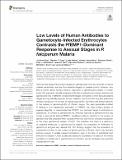Low Levels of Human Antibodies to Gametocyte-Infected Erythrocytes Contrasts the PfEMP1-Dominant Response to Asexual Stages in P. falciparum Malaria

View/
Publication Date
2018Author
Jo-Anne Chan1, Damien R. Drew1 , Linda Reiling1 , Ashley Lisboa-Pinto1 , Bismarck Dinko2 , Colin J. Sutherland3 , Arlene E. Dent 4 , Kiprotich Chelimo5 , James W. Kazura4 , Michelle J. Boyle1 and James G. Beeso
Metadata
Show full item recordAbstract/
Vaccines that target Plasmodium falciparum gametocytes have the potential to reduce
malaria transmission and are thus attractive targets for malaria control. However, very
little is known about human immune responses to gametocytes present in human
hosts. We evaluated naturally-acquired antibodies to gametocyte-infected erythrocytes
(gametocyte-IEs) of different developmental stages compared to other asexual parasite
stages among naturally-exposed Kenyan residents. We found that acquired antibodies
strongly recognized the surface of mature asexual-IEs, but there was limited reactivity
to the surface of gametocyte-IEs of different stages. We used genetically-modified
P. falciparum with suppressed expression of PfEMP1, the major surface antigen of
asexual-stage IEs, to demonstrate that PfEMP1 is a dominant target of antibodies to
asexual-IEs, in contrast to gametocyte-IEs. Antibody reactivity to gametocyte-IEs was
similar to asexual-IEs lacking PfEMP1. Significant antibody reactivity to the surface of
gametocytes was observed when outside of the host erythrocyte, including recognition
of the major gametocyte antigen, Pfs230. This indicates that there is a deficiency
of acquired antibodies to gametocyte-IEs despite the acquisition of antibodies to
gametocyte antigens and asexual IEs. Our findings suggest that the acquisition of
substantial immunity to the surface of gametocyte-IEs is limited, which may facilitate
immune evasion to enable malaria transmission even in the face of substantial host
immunity to malaria. Further studies are needed to understand the basis for the limited
acquisition of antibodies to gametocytes and whether vaccine strategies can generate
substantial immunity.
Keywords: gametocytes, PfEMP1, antibodies, malaria, P. falcipa
